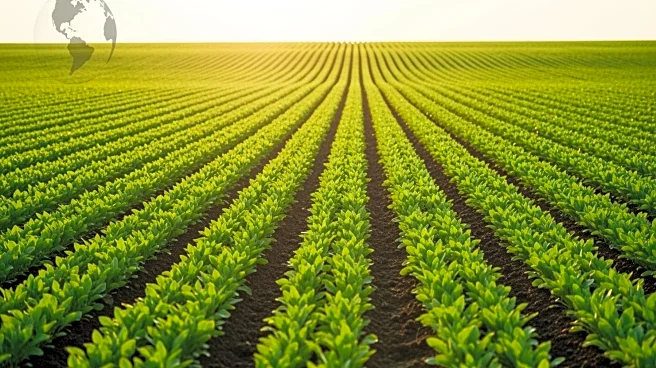What's Happening?
The Surinamese government has launched the SURGE program, aimed at boosting the agricultural sector by supporting local entrepreneurs. This initiative, financially backed by the World Bank, has seen a significant
number of agriculture-related businesses apply for participation. The program, which began in 2023, selected five companies focused on fruit and vegetable production to receive assistance. Among these is a cherry producer that has achieved certification under the Demeter label, exporting all its pulp and planning to expand its cultivation area significantly. The program also supports growers using advanced greenhouse technology to enhance crop production.
Why It's Important?
The SURGE program represents a strategic effort by Suriname to diversify its economy, which has traditionally relied heavily on oil and gas. By investing in agriculture, the government aims to create sustainable growth and employment opportunities. The involvement of the World Bank underscores the international support for Suriname's economic development. This initiative could lead to increased agricultural exports, boosting the country's GDP and providing a model for other nations seeking to strengthen their agricultural sectors. Entrepreneurs stand to benefit from increased access to resources and expertise, potentially transforming Suriname into a regional agricultural hub.
What's Next?
As the SURGE program progresses, participating businesses are expected to scale up their operations, potentially leading to increased agricultural output and exports. The government may continue to seek international partnerships to further support the sector. Monitoring the program's impact on local economies and employment rates will be crucial. Additionally, the success of these initiatives could encourage further investment in Suriname's agriculture, tourism, and other sectors, contributing to a more diversified and resilient economy.
Beyond the Headlines
The emphasis on agriculture highlights a shift towards sustainable development, which could have long-term environmental benefits. By adopting advanced technologies and practices, Suriname's agricultural sector may reduce its ecological footprint while increasing productivity. This approach aligns with global trends towards sustainable agriculture and could enhance Suriname's reputation as a responsible producer on the international stage.










